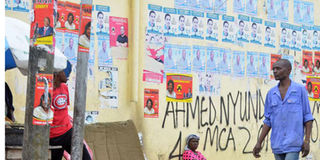We need to keep the environment clean during election campaigns

A resident of Mvita, Mombasa County, walks past a wall pasted with campaign posters, on June 29, 2017. It should be made an election offence to stick posters elsewhere. PHOTO | KEVIN ODIT | NATION MEDIA GROUP
What you need to know:
- During campaigns, towns, villages and streets are polluted with posters and noise!
- In future, campaign posters should be banned. Candidates should use electronic media to campaign.
Our elections always leave the country looking like a pigsty.
During campaigns, towns, villages and streets are polluted with posters and noise!
Although, the just-ended vote seems to have been less chaotic than previous ones, local authorities could be more innovative to make candidates respect the environment and not leave the already dirty towns and villages worse off. Here are some suggestions.
OFFENCE
Local authorities could hire out removable panels to parties or candidates.
The panels should be erected in strategic areas such as bus stops or market places.
It should be made an election offence to stick posters elsewhere.
All posters should carry the politicians’, agents’, party’s and printer’s address.
Posters without proper and legitimate addresses should be removed and the candidate penalised.
RECYCLED PAPER
The advertising fees would be used to employ youth squads to remove and clean up the panels.
The boards should preferably be made from recycled plastic.
The posters themselves should be made of recycled paper.
Further, a candidate should stick only one large poster on the board, therefore, saving on cost.
ELECTRONIC MEDIA
It makes no sense to have hundreds of A4 size posters on a roadside only for the competitor to stick theirs over them.
In addition, aspirants should not use posters before campaigns begin.
Today, election campaign posters start appearing long before the campaigns.
Official campaign timelines should be strictly adhered to.
In future, campaign posters should be banned. Candidates should use electronic media to campaign.
SOCIAL MEDIA
This is not preposterous. Today, almost every Kenyan listens to some radio station.
TV viewership is rising even in the countryside. The future of political campaigning, though, will be in social media.
In fact, to capture the youthful voter, there will be few options away from social media.
More obnoxious is spraying incoherent campaign messages on walls and by the roadsides.
MIDDLE CLASS
Unfortunately, this is done at night and could prove difficult to control and penalise.
Graffiti is part of middle class guerrilla campaign genre.
Graffiti is a nightmare to local authorities in the west, so much that some cities have graffiti effacing departments.
We have not reached that stage, but with a rising middle class we are heading there.
Early preventive measure are in order. On noise pollution, Nema should crack down!
NOISE
There are already laws on this, I suppose, although the relative permissible decibel levels are not clear.
This noisy political messaging should be contained. There should not be a fee to make noise.
It is awkward to allow some people to shout as much as they can, using the latest ear-shattering equipment just because they pay for it.
Perhaps we can enact laws banning the use of loud speakers mounted on motor vehicles at night and day, addressing no one in particular.
DEBATES
Few people listen to such messages anyway.
How about wooing one’s supporters in social halls or church, mosque or if not possible at a chief’s camp?
Some counties had orderly, animated debates for candidates.
This should be encouraged. But rules and regulations are all useless without discipline at collective and individual levels.
Effectiveness of code of conduct depends on how enforcement is carried out.
DISCIPLINE
All laws and policies are useless without enforcement.
The Hammurabis, Moseses, the Romans knew that. Will are poor in this score.
Discipline in observing the laid-down code of conduct comes with civic education and the penalties.
We may need to go the Rwanda style, where disorder has become an anathema.
If people understand the importance of orderly campaigns and the consequences of disorder, a culture of cleanliness will develop.
But rot starts from the head. Discipline start from the top. Just visit Kigali and see this in practice.
Dr Mbataru teaches policy at Kenyatta University. [email protected]





